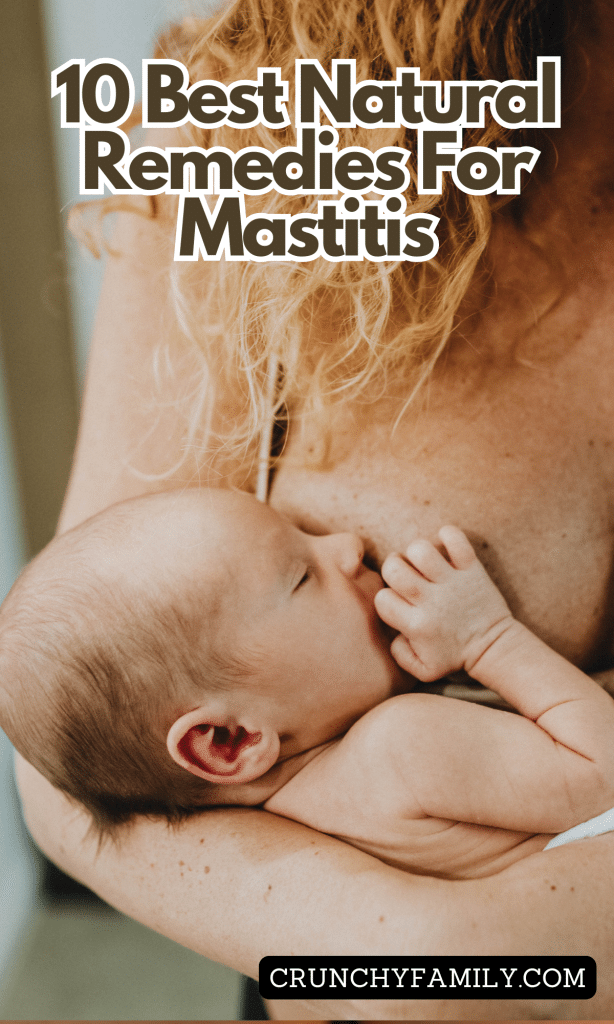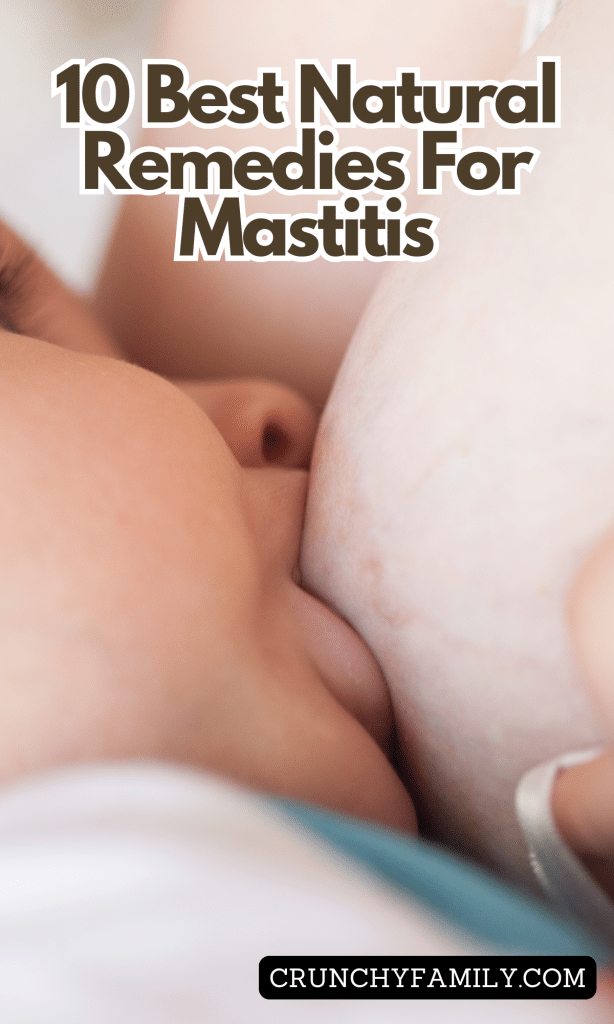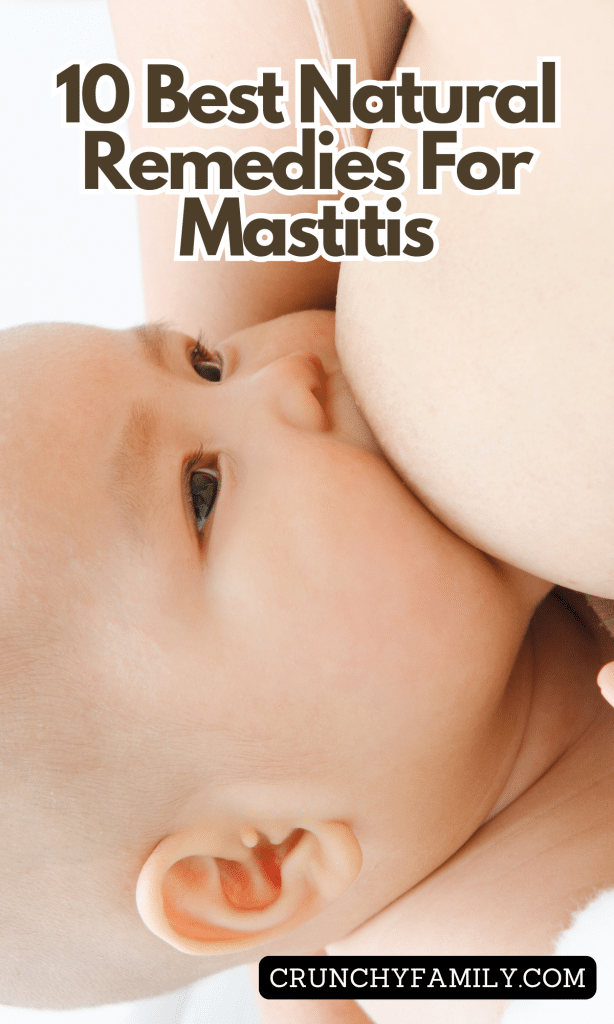The beginning of my breastfeeding journey was a bit of a rollercoaster. My daughter wasn’t latching properly due to a tongue and lip tie, and I believe that contributed to a mild episode of mastitis. At that time, I didn’t know much about this painful condition and was quite overwhelmed.
Luckily, with a bit of warm compress therapy and some gentle massage, it cleared up within a couple of days. For any nursing mother out there who might be facing similar struggles, let me share some natural remedies that can help soothe mastitis and get you back on track with your breastfeeding journey.
Here are my top 10 natural remedies for mastitis that can ease your pain and discomfort.

Before getting into the remedies, it also helps so much if you’re able to continue feeding your baby during this time. From my experience, nothing can drain the best as well as a feeding baby, and if you stop feeding during this time it can make the mastitis and engorgement worse so we would definitely recommend to power through.
You can also try pumping to reduce some of the engorgement, but it is totally safe to continue feeding baby while you have mastitis, it’s not something you can pass on to them. Some moms find that the milk tastes a little salty during this time, but is still totally safe and the more you can put baby to the breast, the quicker and more effectively it can help to clear the infection and have you feeling better again.
Natural Remedies for Mastitis
In addition to continued feeding, try some of these natural remedies which can help relieve your mastitis.
1. Warm Compress and Hot Showers
Using a warm compress or taking a hot shower can work wonders for a clogged milk duct or blocked milk duct. Applying heat to the affected area helps in improving blood flow, which can ease breast pain and promote milk flow. I found that placing a warm cloth or using a hot water bottle on the affected breast before nursing or pumping really helped loosen things up, making it easier for my daughter to latch and drain the milk ducts properly.
Tip: Try massaging the affected breast while in the warm shower. The combination of warmth and gentle massage can help unclog the duct and relieve inflammation of the breast tissue.
2. Cabbage Leaves

You may have heard about this age-old remedy, but it truly is a lifesaver! Cold cabbage leaves, when placed on the sore breast, can reduce swelling and provide relief from pain. This is especially helpful if you’re dealing with breast engorgement, which often accompanies mastitis.
Simply place a chilled cabbage leaf over the affected area for 20 minutes a few times a day, but make sure not to leave it on for too long, as it may reduce milk supply.
3. Sunflower Lecithin
Sunflower lecithin is an excellent natural supplement that can help with clogged ducts and improve milk flow. It works by reducing the stickiness of breast milk, making it easier for milk to flow freely through the mammary glands. It’s a great addition to your diet if you’re struggling with frequent plugged ducts or an oversupply of milk.
4. Massage and Lymphatic Drainage

A gentle breast massage can be incredibly effective in easing mastitis symptoms. Using a bit of olive oil or castor oil, gently massage from the affected area toward the nipple, focusing on the sore spots.
This can help to unblock the milk ducts and improve milk production. Incorporating lymphatic drainage techniques can also help reduce breast inflammation and improve circulation, which speeds up healing.
5. Raw Potato Poultice
Believe it or not, raw potato slices can provide relief from the pain and swelling associated with mastitis. Potatoes have anti-inflammatory properties that help reduce the inflammation of breast tissue.
Place thin slices of raw potato on the affected breast for about 30 minutes, or grate a raw potato and apply the pulp as a poultice.
6. Essential Oils (Tea Tree Oil)

Essential oils like tea tree oil have strong antibacterial properties and can be helpful in treating mastitis. Dilute a few drops of tea tree oil in a carrier oil like olive oil and apply it to the affected area.
This can help reduce bacterial infection and promote healing. Be sure to wash it off before nursing to avoid any potential risks for your baby.
7. Vitamin C and D
Maintaining a strong immune system is crucial when dealing with mastitis. Vitamin C and vitamin D are both great for boosting your body’s natural defenses, which can help fight off bacterial infections like staphylococcus aureus or escherichia coli.
Include more foods rich in these vitamins in your diet or consider taking a supplement after consulting with a healthcare provider.
8. Probiotic Supplements

Probiotics are great for maintaining a healthy microbiome, which is essential for preventing bacterial mastitis.
Probiotic supplements can help to reduce the risk of mastitis and support overall immune health, making them an excellent addition to your natural treatment plan.
Yoghurt can also help, since many kinds are full of probiotics.
Related: 10 Unusual Ways To Use Yoghurt You Need To Know
9. Herbal Teas
Certain herbal teas like chamomile and echinacea are known for their anti-inflammatory and immune-boosting properties, which can aid in the treatment of mastitis. A cup of warm herbal tea can help with relaxation, reduce inflammation, and promote healing.
Note: Always consult with a lactation consultant or healthcare provider before trying new herbal remedies, especially when breastfeeding.
10. Proper Rest and Self-Care

Lastly, never underestimate the power of proper care and rest. Mastitis can be triggered or worsened by stress, fatigue, or even postpartum depression.
Ensure you’re getting enough sleep, staying hydrated, and taking care of yourself. Using cold compresses or an ice pack on the affected breast can also help reduce pain and inflammation.
Mastitis can be a challenging and painful condition, but with these natural remedies, you can find relief and get back to enjoying your breastfeeding journey. Remember, if you experience severe symptoms of mastitis or if your condition doesn’t improve within a couple of days, it’s always a good idea to consult a healthcare provider.
Breastfeeding is a beautiful experience, but it does come with its fair share of bumps along the way. With the right care, support, and some natural treatments, you can overcome mastitis and continue providing your baby with the best nourishment possible.
More related reads:
- Breastfeeding Is Not Supposed to Be Painful
- 8 Tips For Increasing Your Milk Supply
- On Demand VS Scheduled Breastfeeding: Which One Is Best For you?
- What are the Benefits of Comfort Breastfeeding?
- Solid Foods Introduction Guide
- When Does Breastfeeding Get Easier?
- Best protein powder for nursing moms
- Sample Natural Birth Plans (Free Printable Fill in Template)